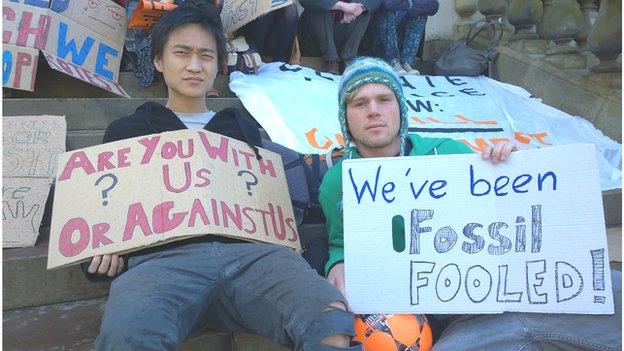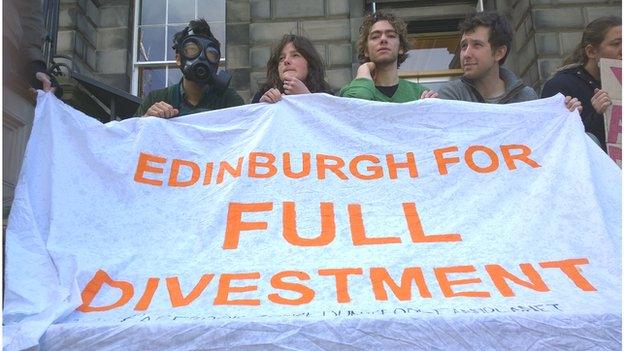Edinburgh University to continue investing in fossil fuel firms
- Published

Edinburgh University is to continue investing in companies that produce fossil fuels, it has announced.
The university said it would instead work with firms in an attempt to reduce their emissions.
The institution had carried out a consultation after its students' association asked it to reconsider its position on fossil fuel investment.
Environmental campaigners described the decision as "disappointing" and a "missed opportunity".
The university had established a Fossil Fuels Review Group to look into the issue.
Responsible investment
Announcing the changes to its policy, the university said its choices had not been limited to no change or pulling out of all investments.
It said it would use its research activities and "responsible investment" to work with companies to reduce their emissions.
The university will require companies to report on their emissions and benchmark them according to the best performance in their sector.
It said it would focus on companies involved in the extraction of coal and tar sands, the highest carbon-emitting fossil fuels.
"The university will withdraw from investment in these companies if realistic alternative sources of energy are available and the companies involved are not investing in technologies that help address the effects of carbon emissions and climate change," it said.
Last year, Glasgow University became the first in the UK to announce it would sell off the shares it holds in companies that produce fossil fuels.
'Moral lead'
Prof Charlie Jeffery, Edinburgh University's senior vice principal, said: "The decision outlines our commitment to use the leverage of our investments to bring about change that reduces carbon emissions in the fossil fuels and other sectors, and to press further with our world-leading research activities that actively contribute to the solution of problems arising from fossil fuel emissions and the identification of alternative technologies.
"As a global civic institution, the University of Edinburgh will continue to take its lead through our research, teaching and knowledge exchange and helping society understand, manage and reduce climate risks."
However, WWF Scotland director Lang Banks said: "It's disappointing that Edinburgh University has chosen not to join the growing number of organisations opting to divest from climate-trashing fossil fuels.
"The science is clear, to protect our climate the vast majority of known fossil fuel reserves must remain unburned and in the ground."
Ric Lander, Friends of the Earth Scotland finance campaigner, said: "The university has missed a clear opportunity to take a moral lead on tackling climate change and stand up for environmental justice.
"The university appears content to have its money invested in the world's most polluting companies, including Shell, BHP Billiton and Rio Tinto.
"These companies are oil drilling in the Arctic and mining coal in virgin rainforest. Any investment policy which continues to allow investment in such irresponsible companies is not fit for purpose."

Prof Paul Younger, professor of Energy Engineering at Glasgow University, said: "Having been plunged involuntarily into the midst of the fossil fuel divestment debate when my own institution ploughed ahead with a simplistic commitment to divest from fossil fuels, as if all are equally damaging to the climate and as if simple alternatives exist for all their uses, it is refreshing to see the University of Edinburgh propose a policy that is consistent both with ethical principles and with what is technically feasible.
"Their stance is actually very similar to that adopted by the Church of England.
"I applaud both institutions for taking the time to probe the science and engineering constraints on the urgent need to reduce greenhouse gas emissions.
"No such precaution was taken by my own university, with the result that we are now mired in a needless debate, in which the desire to avoid losing face is poised to overrule the application of reason."
- Published9 October 2014
